| Germany in the Eurovision Song Contest | |
|---|---|

| |
| Participating broadcaster |
Former members
|
| Participation summary | |
| Appearances | 66 |
| First appearance | 1956 |
| Highest placement | 1st: 1982, 2010 |
| Host | 1957, 1983, 2011 |
| External links | |
| NDR page | |
| Germany's page at Eurovision.tv | |
Germany in the Eurovision Song Contest 2023 | |
Germany has officially participated in every Eurovision Song Contest since its inaugural edition in 1956, except in 1996 when its entry did not qualify past the audio-only pre-selection round, and consequently was not seen in the broadcast final and does not count as one of Germany's 66 appearances. No other country has been represented as many times. Along with France, Italy, Spain and the United Kingdom, Germany is one of the "Big Five" countries that are automatically prequalified for the final, due to being the largest financial contributors to the European Broadcasting Union (EBU). The final is broadcast in Germany on ARD's flagship channel, Das Erste.
Germany first won the contest in 1982, when Nicole won with "Ein bißchen Frieden". The second German victory came 28 years later at the 2010 contest, when Lena won with "Satellite". Katja Ebstein, who finished third in 1970 and 1971, then second in 1980, is the only performer to have made the top three on three occasions. Germany has a total of 11 top three placements, also finishing second with Lena Valaitis (1981) and twice with the group Wind (1985 and 1987), and finishing third with Mary Roos (1972), Mekado (1994) and Sürpriz (1999). Germany has finished last on ten occasions, receiving nul points in 1964, 1965 and 2015.
While having not reached the top-ten in 13 of the last 19 contests (2005–23), Michael Schulte achieved Germany's second-best result of the 21st century, by finishing fourth at the 2018 contest. Although German contestants have had varied levels of success, public interest remains high and the contest is one of the most-watched events each year.[1]
History
The Federal Republic of Germany has participated in the contest since its inception in 1956.[2] Before German reunification in 1990, the country was occasionally presented as "West Germany". The German Democratic Republic (East Germany) did not participate in the Eurovision Song Contest, and instead took part in the Intervision Song Contest.
With one win (1982) and four second-place results (1980, 1981, 1985 and 1987), Germany was the second most successful country in the contest in the 1980s, behind Ireland, who had two wins in the decade.
1996 absence
ARD had selected an artist and song to represent them at the 1996 contest, to be held in Oslo, Norway. Due to the large number of countries wanting to compete at Eurovision, the EBU determined that only 23 of the 30 countries could compete. Hosts Norway qualified automatically, the other 29 songs went into an audio-only pre-qualification round, with the top 22 going on to compete alongside Norway in Oslo. Unfortunately for Germany, its entry, Leon with "Planet of Blue", failed to earn enough points to progress to the final, finishing 24th. ARD and the EBU were not happy with this, as Germany was the biggest financial contributor at the time. This is the only time that Germany has been absent from the contest.
2000s
In the 2000s, Germany has been notable for their adoption of musical styles which are not typical of Eurovision, such as country and western (Texas Lightning – "No No Never" in 2006) and swing (Roger Cicero – "Frauen regier'n die Welt" in 2007 and Alex Swings Oscar Sings – "Miss Kiss Kiss Bang" in 2009). Germany had some successes throughout the decade, Lou - "Let's Get Happy" came in 11th place out of 26 in 2003. Germany tied for last in 2008 for points, but was awarded 23rd of 25 places when the results were posted. In 2009, ARD held an internal selection for the first time since 1995 due to lack of interest and viewing figures of the German national finals.[3] Alex Christensen and Oscar Loya were selected to represent Germany at the 2009 contest, where they performed on stage with burlesque artist Dita Von Teese. However they only managed to receive 35 points, placing 20th of 25 competing countries.
2010s
In 2010, ARD approached former entrant and songwriter Stefan Raab and private network ProSieben to co-operate in finding a winning entry for the country. It has been said that Raab was approached due to his good record at the contest, finishing 5th in 2000 as well as writing entries in 1998 and 2004, which finished 7th and 8th, respectively. Raab agreed and conducted a TV casting show called Unser Star für Oslo which was broadcast on ARD and ProSieben. A winner arose in Lena Meyer-Landrut with "Satellite", who went on to win the contest. Two further collaborations with ProSieben provided the second and third top ten result in a row respectively in 2011 (Lena, who returned to defend her title with "Taken by a Stranger") and 2012 (Roman Lob with "Standing Still").
The streak of top 10 finishes was broken in the 2013 contest, when Cascada's song "Glorious" finished 21st with 18 points. The group Elaiza in 2014, Ann Sophie in 2015, Jamie-Lee in 2016 and Levina in 2017 finished in 18th, 27th (last), 26th (last) and 25th (second to last) place respectively. Ann Sophie became the country's third entry to finish with nul points, after Nora Nova in 1964 and Ulla Wiesner in 1965, and the first since the introduction of the current scoring system in 1975.
Germany's luck changed in 2018, when Michael Schulte brought them back to the top 5 for the first time since 2010 with "You Let Me Walk Alone", finishing in fourth place. This is the first time since 2012 that more than one country from the "Big Five" has made the top ten (with Italy finishing fifth) and the second time (after 2002) that two "Big Five" countries have made the top five since the establishment of the rule. The year after, the duo Sisters with the song "Sister" was not able to replicate the same success, receiving no points from the televote to finish in 25th place overall with 24 points.
2020s
Three further bottom five results were recorded by Germany at the start of the decade, that of Jendrik in 2021 (also receiving no points from the televote), Malik Harris in 2022 (receiving no points from the juries) and Lord of the Lost in 2023.
Organisation
Since 1996, ARD consortium member Norddeutscher Rundfunk (NDR) has been responsible for Germany's participation in the contest. The responsibility for Germany's participation in the contest has changed hands between the different broadcasters over the years:[4]
- Nord-und Westdeutscher Rundfunkverband (NWRV) – 1956
- Hessischer Rundfunk (HR) – 1957, 1959–1961, 1963–1964, 1966–1971, 1973–1977
- Westdeutscher Rundfunk (WDR) – 1958
- Südwestfunk (SWF) – 1962, 1978
- Norddeutscher Rundfunk (NDR) – 1965, 1996–present
- Sender Freies Berlin (SFB) – 1972, 1991
- Bayerischer Rundfunk (BR) – 1979–1990
- Mitteldeutscher Rundfunk (MDR) – 1992–1995
In 1991 SFB worked in partnership with the East German broadcaster Deutscher Fernsehfunk (DFF) to select the German entry for that year's contest. Between 2010 and 2012, private broadcaster ProSieben worked in partnership with NDR.[4]
Germany has often changed the selection process for the country's entry in the contest, with both national finals and internal selections (occasionally a combination of both formats) having been held.[4]
Germany and the "Big Five"
Since 1999, Germany, along with France, Spain and the United Kingdom, have automatically qualified for the Eurovision final regardless of their results in previous contests.[5] These countries earned this special status by being the four biggest financial contributors to the EBU, and subsequently became known as the "Big Four". In 2008, it was reported that the "Big Four" could lose their status and be forced to compete in the semi-finals;[6] however, this never materialised, and the rule remained in place.[7] When Italy returned to the contest in 2011, it was given the same untouchable status, thus upgrading the countries to members of a "Big Five".[8][9]
Germany was the first Big Five country to win the contest after the rule was introduced, courtesy of Lena in 2010. In terms of success, it is currently second behind Italy, which won in 2021 with Måneskin, and finished second in 2011 with Raphael Gualazzi and again in 2019 with Mahmood. However, taking into account Italy's absence from the contest for the first 11 years of the rule's existence, Germany remains the only country to have won out of the original "Big Four".
Participation overview
| 1 | First place |
| 2 | Second place |
| 3 | Third place |
| ◁ | Last place |
| X | Entry selected but did not compete |
| † | Upcoming event |
Congratulations: 50 Years of the Eurovision Song Contest
| Artist | Song | Language | At Congratulations | At Eurovision | |||||
|---|---|---|---|---|---|---|---|---|---|
| Final | Points | Semi | Points | Year | Place | Points | |||
| Nicole | "Ein bißchen Frieden" | German | Failed to qualify | 7 | 106 | 1982 | 1 | 161 | |
Hostings
| Year | Location | Venue | Presenter(s) |
|---|---|---|---|
| 1957 | Frankfurt | Großer Sendesaal | Anaid Iplicjian |
| 1983 | Munich | Rudi-Sedlmayer-Halle | Marlene Charell |
| 2011 | Düsseldorf | Esprit Arena | Anke Engelke, Judith Rakers and Stefan Raab |
Awards
Barbara Dex Award
| Year | Performer | Host city | Ref. |
|---|---|---|---|
| 1998 | Guildo Horn |
Related involvement
Conductors
| Year | Conductor[lower-alpha 10] | Musical Director | Notes | Ref. |
|---|---|---|---|---|
| 1956 | N/A | Host conductor | [12] | |
| 1957 | Willy Berking | [lower-alpha 11] | ||
| 1958 | N/A | Host conductor | ||
| 1959 | ||||
| 1960 | Franz Josef Breuer | |||
| 1961 | Host conductor | |||
| 1962 | Rolf-Hans Müller | |||
| 1963 | Willy Berking | |||
| 1964 | ||||
| 1965 | Alfred Hause | |||
| 1966 | Willy Berking | |||
| 1967 | Hans Blum | |||
| 1968 | Horst Jankowski | |||
| 1969 | Hans Blum | |||
| 1970 | Christian Bruhn | [13] | ||
| 1971 | Dieter Zimmermann | |||
| 1972 | Paul Kuhn | |||
| 1973 | Günther-Eric Thöner | |||
| 1974 | Werner Scharfenberger | |||
| 1975 | Rainer Pietsch | |||
| 1976 | ||||
| 1977 | Host conductor | |||
| 1978 | Jean Frankfurter | |||
| 1979 | ||||
| 1980 | Wolfgang Rödelberger | [14] | ||
| 1981 | ||||
| 1982 | ||||
| 1983 | Dieter Reith | |||
| 1984 | N/A | Host conductor | ||
| 1985 | Rainer Pietsch | |||
| 1986 | Hans Blum | |||
| 1987 | ||||
| 1988 | ||||
| 1989 | No conductor | |||
| 1990 | Rainer Pietsch | |||
| 1991 | Hermann Weindorf | |||
| 1992 | ||||
| 1993 | ||||
| 1994 | ||||
| 1995 | Hermann Weindorf | |||
| 1997 | No conductor | |||
| 1998 | Stefan Raab | [lower-alpha 12] | ||
Heads of delegation
| Year | Head of delegation | Ref. |
|---|---|---|
| 1996–2005 | Jürgen Meier-Beer | |
| 2007–2008 | Manfred Witt | |
| 2015 | Torsten Amarell | |
| 2016–2017 | Carola Conze | |
| 2018–2019 | Christoph Pellander | |
| 2020–present | Alexandra Wolfslast |
Commentators and spokespersons
Over the years, commentary on ARD has been provided by several experienced radio and television presenters, including Ado Schlier, Thomas Gottschalk, Jan Hofer, Wolf Mittler, Fritz Egner and Werner Veigel. Peter Urban has provided commentary on Das Erste every year since 1997, and has only been absent once, in 2009, when he was forced to step down due to illness, with Tim Frühling from HR filling in to commentate in Moscow.[21] For the later-cancelled 2020 contest, Michael Schulte was set to commentate together with Urban. Both commentated the official EBU replacement show Eurovision: Europe Shine a Light instead, as well as the German replacement show Eurovision 2020 – das deutsche Finale from the Elbphilharmonie in Hamburg. Urban stepped down as the German commentator after the 2023 contest.[22]
| Year | Commentator | Spokesperson | Ref. |
|---|---|---|---|
| 1956 | Wolf Mittler | No spokesperson | |
| 1957 | Joachim Fuchsberger | ||
| 1958 | Claudia Doren | ||
| 1959 | Elena Gerhard | Hans-Joachim Rauschenbach | |
| 1960 | Wolf Mittler | ||
| 1961 | Heinz Schenk | ||
| 1962 | Ruth Kappelsberger | Klaus Havenstein | |
| 1963 | Hanns-Joachim Friedrichs | Werner Veigel | |
| 1964 | Hermann Rockmann | Lia Wöhr | |
| 1965 | |||
| 1966 | Hans-Joachim Rauschenbach | Werner Veigel | |
| 1967 | Karin Tietze-Ludwig | ||
| 1968 | Hans-Otto Grünefeldt | ||
| 1969 | |||
| 1970 | Marie-Louise Steinbauer | ||
| 1971 | Hanns Verres | No spokesperson | |
| 1972 | |||
| 1973 | |||
| 1974 | Werner Veigel | Hanns-Joachim Friedrichs | |
| 1975 | TBC | ||
| 1976 | Wilhelm Stöck | ||
| 1977 | |||
| 1978 | Sigi Harreis[23] | ||
| 1979 | Ado Schlier, Gabi Schnelle | Lotti Ohnesorge | |
| 1980 | Ado Schlier[24] | TBC | |
| 1981 | |||
| 1982 | |||
| 1983 | Carolin Reiber | ||
| 1984 | Ruth Kappelsberger | ||
| 1985 | Christoph Deumling | ||
| 1986 | |||
| 1987 | Christoph Deumling, Lotti Ohnesorge | Gabi Schnelle | |
| 1988 | Nicole, Claus-Erich Boetzkes | Lotti Ohnesorge | |
| 1989 | Thomas Gottschalk | Gabi Schnelle | |
| 1990 | Fritz Egner | ||
| 1991 | Max Schautzer | Christian Eckhardt | |
| 1992 | Jan Hofer | Carmen Nebel | |
| 1993 | |||
| 1994 | |||
| 1995 | Horst Senker | ||
| 1996 | Ulf Ansorge | Did not participate | |
| 1997 | Peter Urban | Christina Mänz | |
| 1998 | Nena | ||
| 1999 | Renan Demirkan | ||
| 2000 | Axel Bulthaupt | ||
| 2001 | |||
| 2002 | |||
| 2003 | |||
| 2004 | Thomas Anders | ||
| 2005 | Thomas Hermanns | ||
| 2006 | |||
| 2007 | |||
| 2008 | |||
| 2009 | Tim Frühling | Thomas Anders | |
| 2010 | Peter Urban | Hape Kerkeling | |
| 2011 | Ina Müller | ||
| 2012 | Anke Engelke | ||
| 2013 | Lena Meyer-Landrut | ||
| 2014 | Helene Fischer | ||
| 2015 | Barbara Schöneberger | ||
| 2016 | |||
| 2017 | |||
| 2018 | |||
| 2019 | |||
| Not announced before cancellation | [25][26] | ||
| 2021 | Peter Urban | Barbara Schöneberger | |
| 2022 | [27][28][29][30][31] | ||
| 2023 | Elton |
Other shows
| Show | Commentator | Channel | Ref. |
|---|---|---|---|
| Songs of Europe | Unknown | Das Erste | |
| Congratulations: 50 Years of the Eurovision Song Contest | Peter Urban | SWR, WDR | |
| Eurovision Song Contest's Greatest Hits[lower-alpha 13] | NDR, MDR, EinsFestival | ||
| Eurovision: Europe Shine a Light[lower-alpha 14] | Peter Urban, Michael Schulte | Das Erste |
Photogallery
See also
Notes and references
Notes
- ↑ Arbeitsgemeinschaft der öffentlich-rechtlichen Rundfunkanstalten der Bundesrepublik Deutschland
- 1 2 The 1956 contest had secret voting and, apart from the winner, no results were released.
- ↑ Contains words in English, French, Italian and Spanish
- ↑ Contains the repeated French title.
- ↑ Contains lines in French, English, and Spanish
- ↑ In order to reduce the number of participating countries at the 1996 event a qualifying round was held among all countries except the hosts. Germany failed to progress from this round; entries which failed to progress have subsequently been discounted by the EBU and do not feature as part of the countries' list of appearances.
- ↑ Contains phrases in Hebrew
- ↑ The 2020 contest was cancelled due to the COVID-19 pandemic.
- ↑ Contains two sentences in German
- ↑ All conductors are of German nationality unless otherwise noted.
- ↑ Also conducted for Belgium, Luxembourg, and Switzerland
- ↑ Although the song didn't actually feature the orchestra, Raab still took the conductor's bow as the song's composer, writer, and arranger.
- ↑ Broadcast on 16 May (NDR and MDR Fernsehen) and 22 May (EinsFestival)
- ↑ Broadcast on a one-hour delay.
References
- ↑ Mantel, Uwe (14 May 2023). "Die Quote stimmt: "ESC" holt höchste Marktanteile seit Lena" [The rate is right: "ESC" has the highest market share since Lena]. DWDL.de. Retrieved 10 August 2023.
- ↑ "Eurovision 1956 Results: Voting & Points". Eurovisionworld. Retrieved 4 March 2020.
- ↑ Floras, Stella (16 December 2008). "Germany: No national final for 2009". ESCToday. Retrieved 26 May 2009.
- 1 2 3 "Alle deutschen ESC-Acts und ihre Titel". www.eurovision.de (in German). ARD. Archived from the original on 12 June 2023. Retrieved 12 June 2023.
- ↑ O'Connor, John Kennedy (2005). The Eurovision Song Contest 50 Years The Official History. London: Carlton Books Limited. ISBN 1-84442-586-X.
- ↑ Murray, Gavin (28 May 2008). "Big 4 (France: Germany; Spain; United Kingdom): May lose automatic place in Eurovision final". ESCToday. Retrieved 13 September 2008.
- ↑ Viniker, Barry (14 September 2008). "Eurovision 'Big Four' final spots confirmed". ESCToday. Retrieved 14 September 2008.
- ↑ "SERBIA - Svante Stockselius meets members of OGAE Serbia". Archived from the original on 12 February 2010. Retrieved 24 May 2009.
- ↑ Fulton, Rick (14 May 2007). "The East V West Song Contest". Daily Record. Retrieved 24 May 2009.
- ↑ "'Das Deutsche Finale 2024': Germany's road to Malmö". Eurovision.tv. EBU. 7 September 2023. Retrieved 7 September 2023.
- ↑ Adams, William Lee (9 July 2015). "Poll: Who was the worst dressed Barbara Dex Award winner?". Wiwibloggs. Retrieved 8 December 2019.
- ↑ Roxburgh, Gordon (2012). Songs for Europe: The United Kingdom at the Eurovision Song Contest. Vol. One: The 1950s and 1960s. Prestatyn: Telos Publishing. pp. 93–101. ISBN 978-1-84583-065-6.
- ↑ Roxburgh, Gordon (2014). Songs for Europe: The United Kingdom at the Eurovision Song Contest. Vol. Two: The 1970s. Prestatyn: Telos Publishing. pp. 142–168. ISBN 978-1-84583-093-9.
- ↑ Roxburgh, Gordon (2016). Songs for Europe: The United Kingdom at the Eurovision Song Contest. Vol. Three: The 1980s. Prestatyn: Telos Publishing. ISBN 978-1-84583-118-9.
- ↑ Rau, Oliver (23 May 2005). "Jürgen Meier-Beer withdraws". esctoday.com. Retrieved 18 December 2019.
- ↑ "Eurovision Rewrites the Rule Book". dw.com. 7 October 2007. Retrieved 18 December 2019.
- ↑ Granger, Anthony (6 September 2015). "Germany: Carola Conze New Head of Delegation". eurovoix.com. Retrieved 5 December 2019.
- ↑ Granger, Anthony (1 November 2017). "Germany: Carola Conze Steps Down as Head of Delegation". eurovoix.com. Retrieved 5 December 2019.
- ↑ Granger, Anthony (2 March 2019). "Germany: Christoph Pellander To Step Down as Head of Delegation in July". eurovoix.com. Retrieved 5 December 2019.
- ↑ Kourouvanis, Fotis (5 December 2019). "Germany: New Head of Delegation". eurovisionfun.com. Retrieved 11 December 2019.
- 1 2 3 4 5 6 7 8 9 10 11 12 13 14 15 16 "Dr. Peter Urban kommentiert". duesseldorf2011.de (in German). 17 December 2010. Archived from the original on 24 March 2012. Retrieved 5 July 2011.
- 1 2 "Peter Urban verabschiedet sich vom ESC" [Peter Urban says goodbye to the ESC]. eurovision.de (in German). NDR. 22 March 2023. Retrieved 22 March 2023.
- ↑ Eurovision Club Germany
- ↑ Heller, Erich (25 April 1983). "Langeweile vor dem Grill". tz (in German). p. 11. OCLC 225542327.
- ↑ Bayer, Felix (27 February 2020). "Professionell - aber auch originell?" (in German). Spiegel. Archived from the original on 28 February 2020. Retrieved 28 February 2020.
- ↑ NDR. "ESC 2020: Ben Dolic bei "Unser Lied für Rotterdam"". eurovision.de (in German). Archived from the original on 28 February 2020. Retrieved 28 February 2020.
- ↑ "Wo, wann, was? Alle Sendungen zum ESC 2022". eurovision.de (in German). ARD. 18 November 2021. Archived from the original on 1 December 2021. Retrieved 1 December 2021.
- ↑ "ESC 2022: Shows aus Turin barrierefrei sehen und hören". www.eurovision.de (in German). ARD. 7 April 2022. Retrieved 10 April 2022.
- ↑ Granger, Anthony (18 April 2022). "Germany: Peter Urban to Commentate on Eurovision 2022". Eurovoix. Retrieved 18 April 2022.
- ↑ Granger, Anthony (19 April 2022). "Germany: Deutsche Welle Broadcasting the Grand Final of Eurovision 2022". Eurovoix. Retrieved 19 April 2022.
- ↑ "Die deutsche Jury für den ESC 2022 in Turin". eurovision.de (in German). NDR. Retrieved 10 May 2022.
- ↑ Peter (10 May 2023). "Elton verkündet die deutschen ESC-Jurypunkte 2023 aus Hamburg". ESC kompakt (in German). Retrieved 10 May 2023.
- ↑ Wærhaug, Sølvi (24 August 1981). «Nesten krise …». VG. s. 36.
- ↑ Wærhaug, Sølvi (18 August 1981). «Fire verdensdeler følger Momarkedet». VG. s. 37.
- ↑ "Eurovision Congratulations to be screened in Germany". ESCToday. 28 September 2005. Retrieved 30 September 2019.
- ↑ "Germany: Will Broadcast Eurovision's Greatest Hits". Eurovoix. 2 April 2015. Retrieved 2 April 2015.
- ↑ "Jubiläums-Show: "Eurovision's Greatest Hits" im TV". NDR. 24 April 2015. Archived from the original on 26 April 2015. Retrieved 24 April 2015.
- ↑ Granger, Anthony (26 April 2020). "Germany: Organises Two Shows To Determine The Nations Eurovision 2020 Winner". Eurovoix. Retrieved 9 July 2020.
Works cited
- O'Connor, John Kennedy (2010). The Eurovision Song Contest: The Official History (2nd ed.). London: Carlton Books. ISBN 978-1-84732-521-1.
- Roxburgh, Gordon (2020). Songs for Europe: The United Kingdom at the Eurovision Song Contest. Vol. Four: The 1990s. Prestatyn: Telos Publishing. ISBN 978-1-84583-163-9.
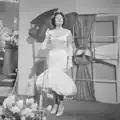
%252C_Bestanddeelnr_923-3699.jpg.webp)

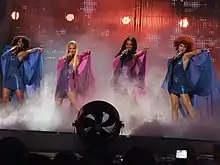
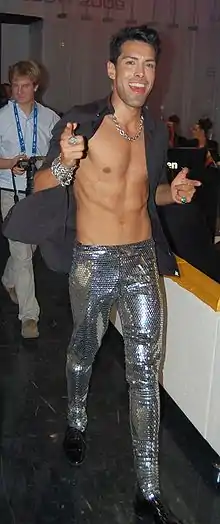
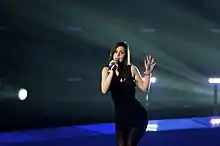
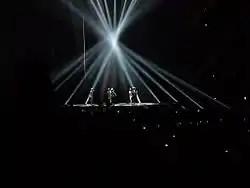

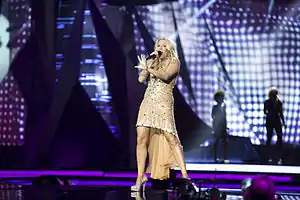
.jpg.webp)

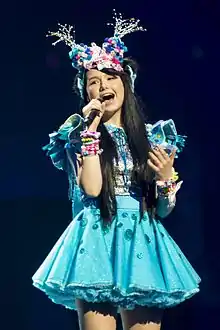

.jpg.webp)
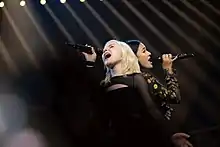

.jpg.webp)